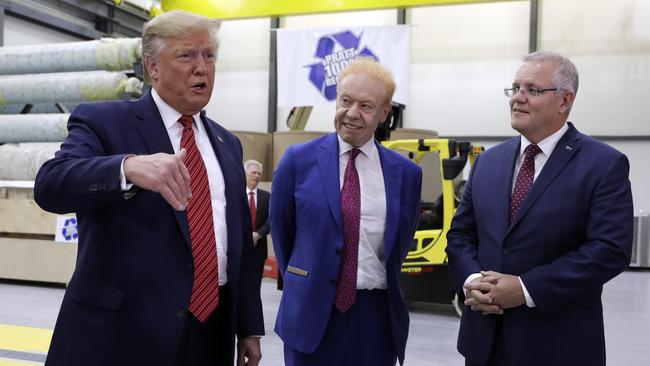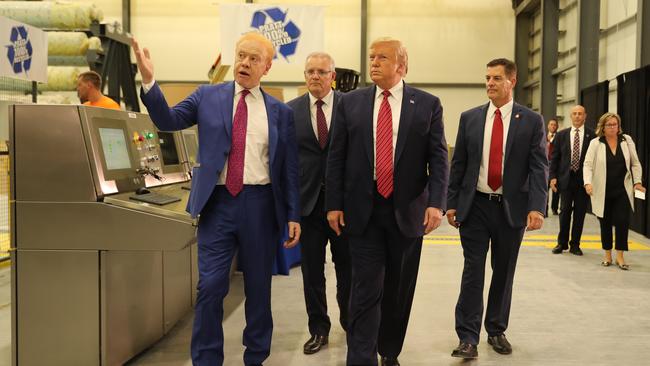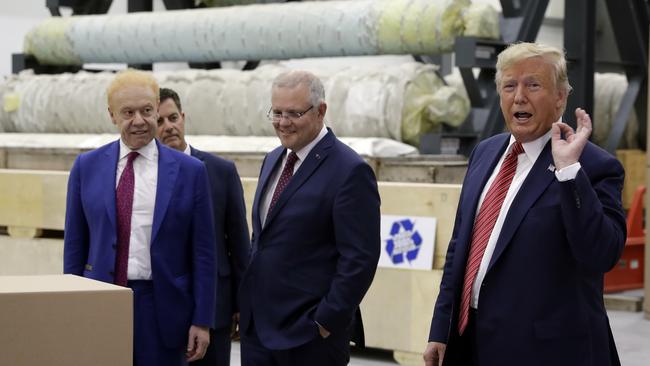Packaging success: Anthony Pratt bets billions on Trump’s America
The packaging king has championed Donald Trump for years. Now it’s really paying off.

The stifling summer humidity was still to descend on West Palm Beach when the guests at President Donald Trump’s Mar-a-Lago resort gathered for dinner in its palatial 15th-century replica dining room on the last Saturday evening in April last year.
On the menu was Mar-a-Lago’s famed meat loaf, cooked following the recipe of the President’s late mother, Mary. After standing to welcome the President, the guests watched as he took a surprise detour towards one and — with a wide-smile — firmly shook his hand.
After a brief jovial conversation, the President proudly proclaimed to the diners: “Ladies and gentlemen, the great Anthony Pratt,” before the room broke into applause.
It was not the first time the 45th American President had led an ovation for the billionaire Australian businessman.
In May 2017, during an event in New York City on the USS Intrepid to mark the 75th anniversary of the Battle of the Coral Sea, President Trump gave Mr Pratt a standing ovation after the businessman pledged that his US paper, packaging and recycling company Pratt Industries would invest $US2 billion in America over the next decade.
Since then Mr Pratt has been regularly taking out full-page advertisements in The Wall Street Journal to thank the Trump administration for supporting US manufacturing and helping expand American food exports.
Last weekend Mr Pratt’s public support of Mr Trump paid off when the President opened Pratt Industries’ new $US270m ($398m) paper mill at Wapakoneta in Ohio, a state that will be key to his re-election bid next November.

Anthony Pratt has been described as an iconic example of the strength of the $1.5 trillion bilateral investment relationship between Australia and the US.
The billionaire now wants to lift Pratt’s market share in the US from 6 per cent to 10 per cent during his lifetime as he works to become a key supplier of boxes and packaging products to direct to consumer companies, especially in the food and beverage sector.
Not only is Pratt working with likes of online giant Amazon to develop packaging for home-delivered, refrigerated products.
It is also helping new niche players like the Boston-based Butcher Box, which delivers grass-fed and organic meat and Atlantic salmon directly to a customer’s door following an online order.
Through its collaboration with Pratt, the company has developed a box that is 100 per cent kerbside recyclable with insulation designed to keep the meat within the optimal temperature range, with a separate compartment for dry ice.
Humble beginnings
From its humble beginnings in a single factory in Macon, Georgia, over the past three decades Pratt — which is still headquartered in Georgia — has grown to be the fifth largest corrugated box manufacturer in America.
The company has built five of America’s last six paper mills, and now has annual revenues of over $4bn. Pratt has invested a total of $1.9bn over the past 30 years to build a network of recycling facilities and manufacturing plants using what Mr Pratt calls a “hub and spoke” strategy of building greenfields mills and then surrounding them with box plants.
It employs 9000 workers in 27 states and in addition to its contracts with Amazon, it supplies the US Postal service with boxes for its online operations, as well as retailers Home Depot, Walmart and Macy’s.
To measure the impact the company has on US economic growth, Pratt earlier this year commissioned the Indiana Business Research Center at Indiana University’s Kelley School of Business to conduct an independent economic impact analysis of the company’s activities.
The study found that in addition to the people it directly employed, Pratt’s operations supported an estimated 29,500 additional ripple effect jobs at other US employers as a result of supply chain purchases and the household spending of its workers.
Since the study was done, Pratt’s direct employment has jumped to more than 9000, so Pratt’s $1.9bn of manufacturing investments are currently supporting almost 40,000 US economy-wide jobs.
Pratt is now also investing hundreds of millions more in expansion projects at five locations, underpinned by two business-friendly policy changes introduced by the Trump government.

The first cut the corporate tax rate from 35 to 21 per cent, which Mr Pratt believes gives his company a $US100m boost annually.
US congress has also passed laws allowing business a full depreciation of capital spending in one year rather than needing to spread it over a longer period.
The Indiana University Study found that by 2020, Pratt’s current and planned investments will support over 40,000 American workers with direct and flow-on benefits. Mr Pratt says a key to this record investment is the company’s 100 per cent private status, which has enabled it to secure long-term 30-year mortgage-style bonds that are only available in America.
Pratt has secured more than $500m worth of debt via the private placement market or so-called 30-year “green bonds” in the US.
The Wapakoneta mill is being financed by a $US210m tax-exempt municipal revenue bond issued by the Ohio Air Quality Development Authority.
In an interview with The Wall Street Journal for its Chicago Global Food Forum in June with US Agricultural Secretary Sonny Perdue, Mr Pratt said he chose the Wapakoneta site because the state and local governments “simply offered us the best deal.”
“They won the bid among the sites that met the criteria we were looking for,’’ Mr Pratt said.
But he also stressed that the new mill — like others he has built — had to be near main highways, close to some of the company’s biggest customers in the food industry and close to recycling facilities to ensure a steady supply of product.
State of the art
Pratt and its Australian subsidiary Visy have established an industrial technology and digital hub in Singapore which is working on ways to incorporate IT, artificial intelligence and robotics into every aspect of their packaging, paper making and recycling businesses.
As a result Wapakoneta has state-of-the-art robotics in every stage of the process, both in the paper mill and the associated box factory (or what Pratt calls, a “millugator”).
“This will enable us to produce paper that is very light in weight and yet perform as well as paper that’s a heavier weight — and the new mill will still produce the requisite tonnes per day (over 1200) to make it economic. That translates into more sustainable packaging for our customers,’’ Mr Pratt said.
The Wapakoneta box plant will employ robotic, driverless forklifts, marking another step toward’s Mr Pratt’s vision for what he calls the ‘lights out’ factory — a fully automated box factory that operates in the dark because “robots don’t need lights”.
“It will help make Wapakoneta the most modern millugator system in the world,’’ Mr Pratt said, noting his company was getting closer to fulfilling his “lights out” vision.
“We used to make 100,000 tonnes of boxes with 200 people. Now, we are making 200,000 tonnes with 100 people. So we are getting closer.”


To join the conversation, please log in. Don't have an account? Register
Join the conversation, you are commenting as Logout